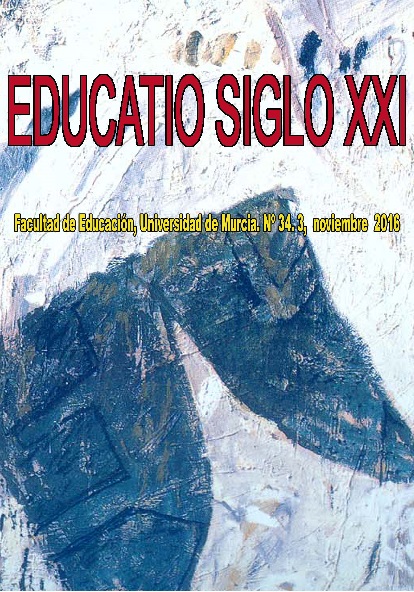Communication, interaction and understanding in multicultural Europe through an update of foreign language teacher training programs
Abstract
The consolidation of Europe as a territorial
unit after the World War II determines the
appearance of a multilingual and multicultural
unprecedented background. The
linguistic policy designed by the Council
of Europe will focus mainly on ensuring
the communication, enrichment, understanding
and territorial and social cohesion
between the states of the European Union.
This objective creates some needs and requirements
which will have to be satisfied
by the Educational Authorities. These organizations
are expected to continue the
path initiated by the Council of Europe
and establish the objectives that educational
institutions are to meet to contribute to
the achievement of this European understanding
and cohesion. As a result of this,
the modern foreign language classroom,
for example, is perceived to be the only
foreign language learning context and the
teacher is assigned the task of accepting
sole responsibility for the teaching and
learning process that takes place in such a
constrained environment.
Inspired by this description of the new European
linguistic and cultural reality and
by the intentions of the European linguistic
and educational policy, we are inclined
to conduct a research that helps to shed
light on two key aspects. Firstly, it is necessary
to establish what those needs and
demands that the new European language
policy has originated. And secondly, an
analysis of a specific foreign language teacher
training program seems to be of the
utmost importance to discover whether
this kind of programs are succeeding in
enabling student teachers to become a
source of linguistic and cultural knowledge
in the Primary Education classroom
or, on the contrary, all efforts made from
within the European Higher Education
Area are not the answer the multicultural
and multilingual Europe requires at the
turn of the century.
Downloads
-
Abstract790
-
PDF (Español (España))501
Original work publishes in this journal is subject to the following terms:
1. Murcia University Press (the publishing house) holds the copyright of the publishes work, and favours and allows their reutilization under the use license stated in point 2.
© Servicio de Publicaciones, Universidad de Murcia, 2015
2. Work is published in the electronic edition under a license (Creative Commons Reconocimiento-NoComercial-SinObraDerivada 4.0 España (legal text). They can be copied, used, disseminated, transmitted and publicly presented, as long as: i) authorship and original publication source is acknowledged (journal, publishing house and URL of the work); ii) are not used for commercial purposes; iii) the existence and specifications of this use license is stated.
3. Conditions for self-archive. Authors are allowed and encouraged to disseminate electronically the pre-pint (before review) and/or post-print (accepted for publication) versions of their work before their publication since that favours earlier circulation and dissemination resulting in an increased chance for the authors to be cited and for the work to reach a bigger share of the academic community. Colour: RoMEO: green.








